Understanding Online Learning and the Theories that Support it
VerifiedAdded on 2023/04/21
|9
|1909
|74
AI Summary
This document provides an in-depth understanding of online learning and the theories that support it. It discusses the benefits and flexibility of online education and explores how cognitive learning theory relates to online learning.
Contribute Materials
Your contribution can guide someone’s learning journey. Share your
documents today.
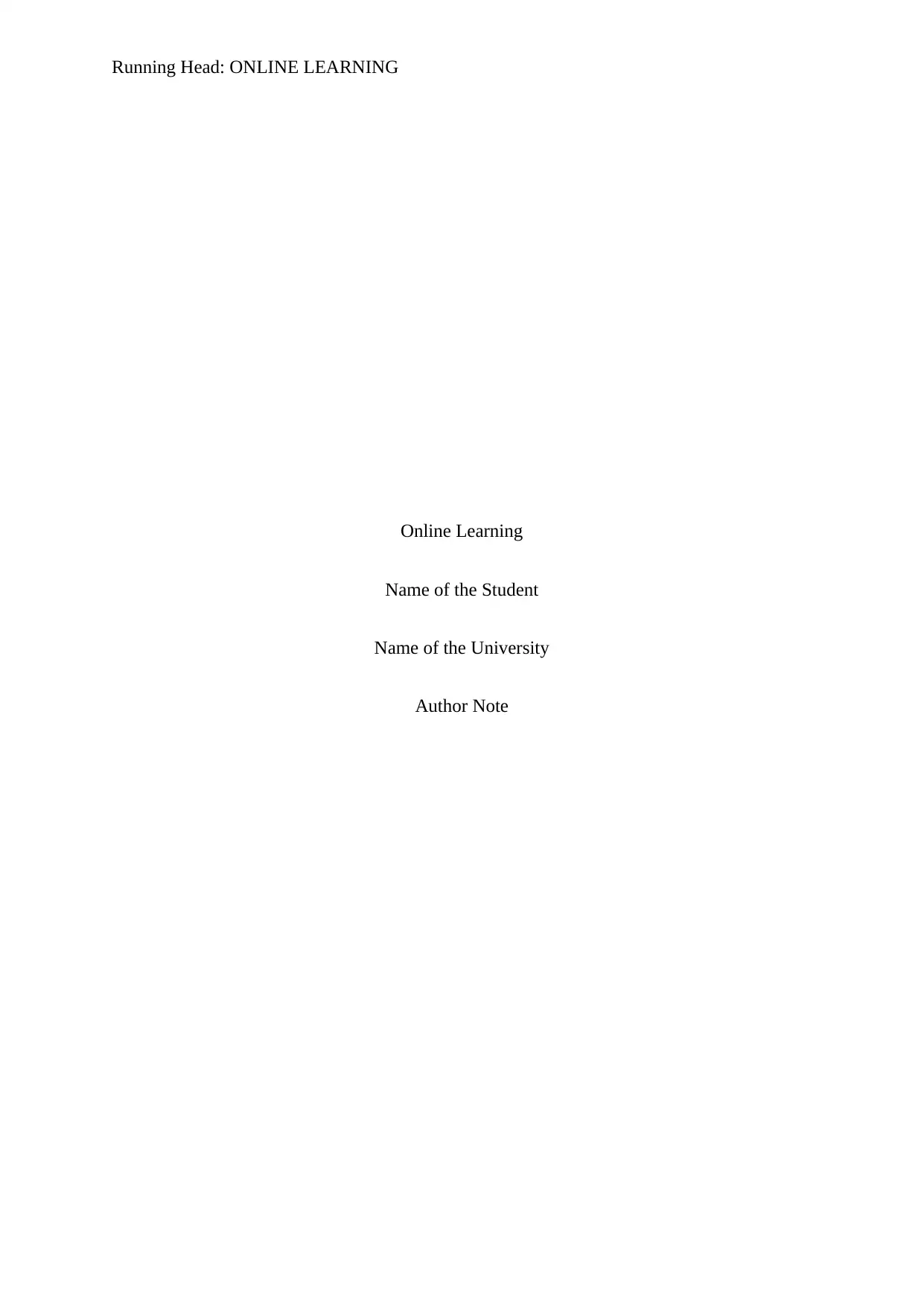
Running Head: ONLINE LEARNING
Online Learning
Name of the Student
Name of the University
Author Note
Online Learning
Name of the Student
Name of the University
Author Note
Secure Best Marks with AI Grader
Need help grading? Try our AI Grader for instant feedback on your assignments.
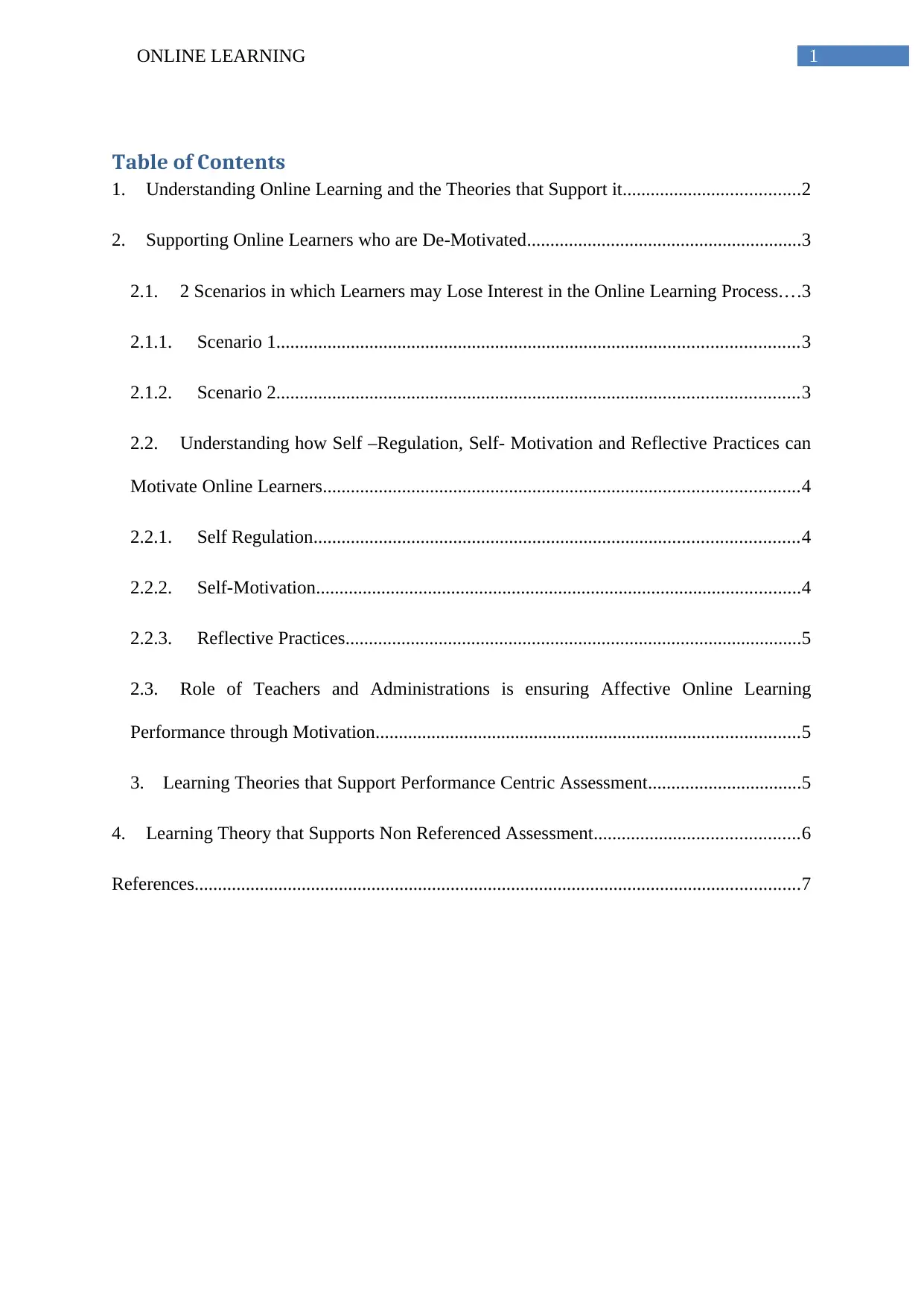
1ONLINE LEARNING
Table of Contents
1. Understanding Online Learning and the Theories that Support it......................................2
2. Supporting Online Learners who are De-Motivated...........................................................3
2.1. 2 Scenarios in which Learners may Lose Interest in the Online Learning Process....3
2.1.1. Scenario 1................................................................................................................3
2.1.2. Scenario 2................................................................................................................3
2.2. Understanding how Self –Regulation, Self- Motivation and Reflective Practices can
Motivate Online Learners......................................................................................................4
2.2.1. Self Regulation........................................................................................................4
2.2.2. Self-Motivation........................................................................................................4
2.2.3. Reflective Practices..................................................................................................5
2.3. Role of Teachers and Administrations is ensuring Affective Online Learning
Performance through Motivation...........................................................................................5
3. Learning Theories that Support Performance Centric Assessment.................................5
4. Learning Theory that Supports Non Referenced Assessment............................................6
References..................................................................................................................................7
Table of Contents
1. Understanding Online Learning and the Theories that Support it......................................2
2. Supporting Online Learners who are De-Motivated...........................................................3
2.1. 2 Scenarios in which Learners may Lose Interest in the Online Learning Process....3
2.1.1. Scenario 1................................................................................................................3
2.1.2. Scenario 2................................................................................................................3
2.2. Understanding how Self –Regulation, Self- Motivation and Reflective Practices can
Motivate Online Learners......................................................................................................4
2.2.1. Self Regulation........................................................................................................4
2.2.2. Self-Motivation........................................................................................................4
2.2.3. Reflective Practices..................................................................................................5
2.3. Role of Teachers and Administrations is ensuring Affective Online Learning
Performance through Motivation...........................................................................................5
3. Learning Theories that Support Performance Centric Assessment.................................5
4. Learning Theory that Supports Non Referenced Assessment............................................6
References..................................................................................................................................7
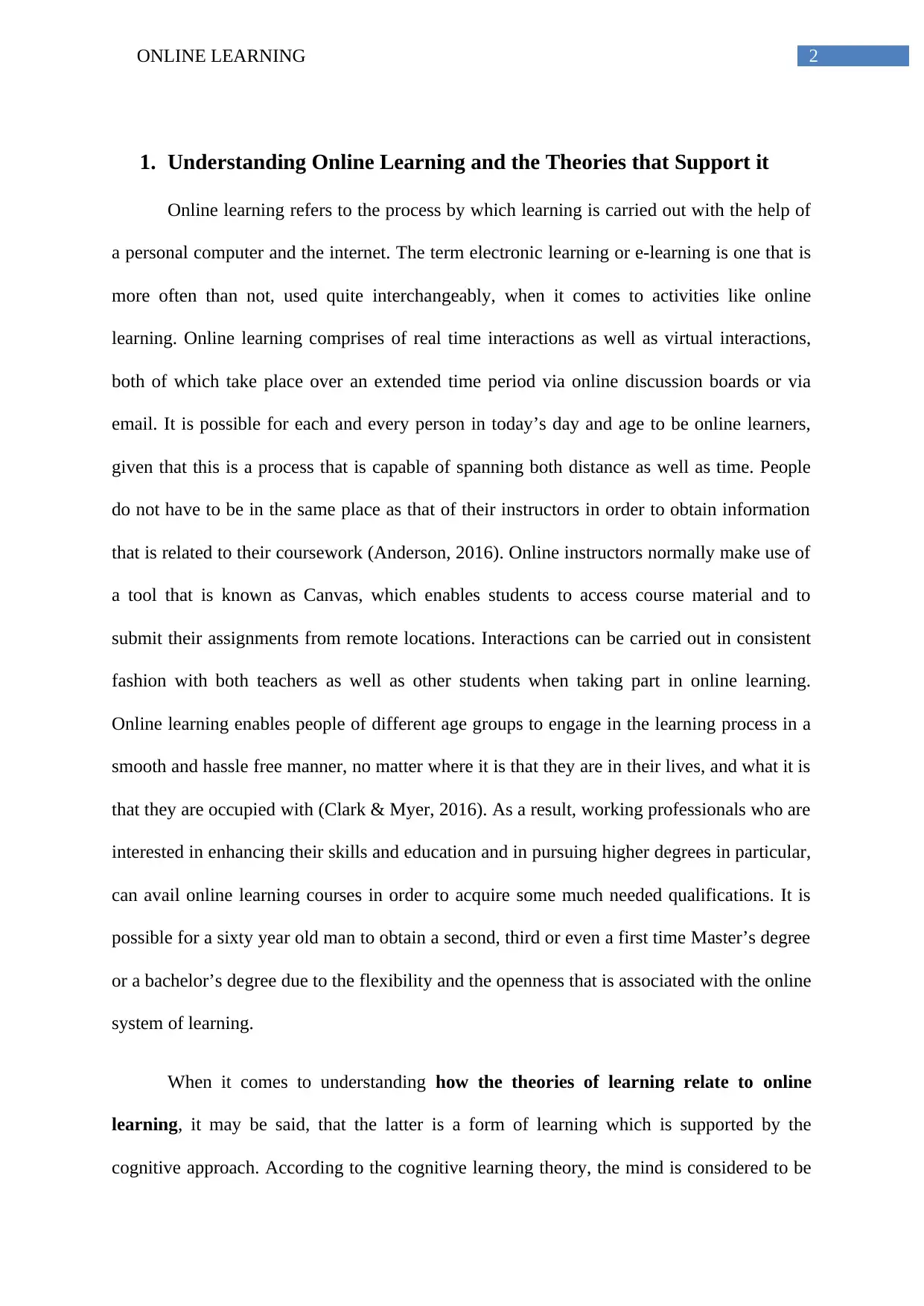
2ONLINE LEARNING
1. Understanding Online Learning and the Theories that Support it
Online learning refers to the process by which learning is carried out with the help of
a personal computer and the internet. The term electronic learning or e-learning is one that is
more often than not, used quite interchangeably, when it comes to activities like online
learning. Online learning comprises of real time interactions as well as virtual interactions,
both of which take place over an extended time period via online discussion boards or via
email. It is possible for each and every person in today’s day and age to be online learners,
given that this is a process that is capable of spanning both distance as well as time. People
do not have to be in the same place as that of their instructors in order to obtain information
that is related to their coursework (Anderson, 2016). Online instructors normally make use of
a tool that is known as Canvas, which enables students to access course material and to
submit their assignments from remote locations. Interactions can be carried out in consistent
fashion with both teachers as well as other students when taking part in online learning.
Online learning enables people of different age groups to engage in the learning process in a
smooth and hassle free manner, no matter where it is that they are in their lives, and what it is
that they are occupied with (Clark & Myer, 2016). As a result, working professionals who are
interested in enhancing their skills and education and in pursuing higher degrees in particular,
can avail online learning courses in order to acquire some much needed qualifications. It is
possible for a sixty year old man to obtain a second, third or even a first time Master’s degree
or a bachelor’s degree due to the flexibility and the openness that is associated with the online
system of learning.
When it comes to understanding how the theories of learning relate to online
learning, it may be said, that the latter is a form of learning which is supported by the
cognitive approach. According to the cognitive learning theory, the mind is considered to be
1. Understanding Online Learning and the Theories that Support it
Online learning refers to the process by which learning is carried out with the help of
a personal computer and the internet. The term electronic learning or e-learning is one that is
more often than not, used quite interchangeably, when it comes to activities like online
learning. Online learning comprises of real time interactions as well as virtual interactions,
both of which take place over an extended time period via online discussion boards or via
email. It is possible for each and every person in today’s day and age to be online learners,
given that this is a process that is capable of spanning both distance as well as time. People
do not have to be in the same place as that of their instructors in order to obtain information
that is related to their coursework (Anderson, 2016). Online instructors normally make use of
a tool that is known as Canvas, which enables students to access course material and to
submit their assignments from remote locations. Interactions can be carried out in consistent
fashion with both teachers as well as other students when taking part in online learning.
Online learning enables people of different age groups to engage in the learning process in a
smooth and hassle free manner, no matter where it is that they are in their lives, and what it is
that they are occupied with (Clark & Myer, 2016). As a result, working professionals who are
interested in enhancing their skills and education and in pursuing higher degrees in particular,
can avail online learning courses in order to acquire some much needed qualifications. It is
possible for a sixty year old man to obtain a second, third or even a first time Master’s degree
or a bachelor’s degree due to the flexibility and the openness that is associated with the online
system of learning.
When it comes to understanding how the theories of learning relate to online
learning, it may be said, that the latter is a form of learning which is supported by the
cognitive approach. According to the cognitive learning theory, the mind is considered to be
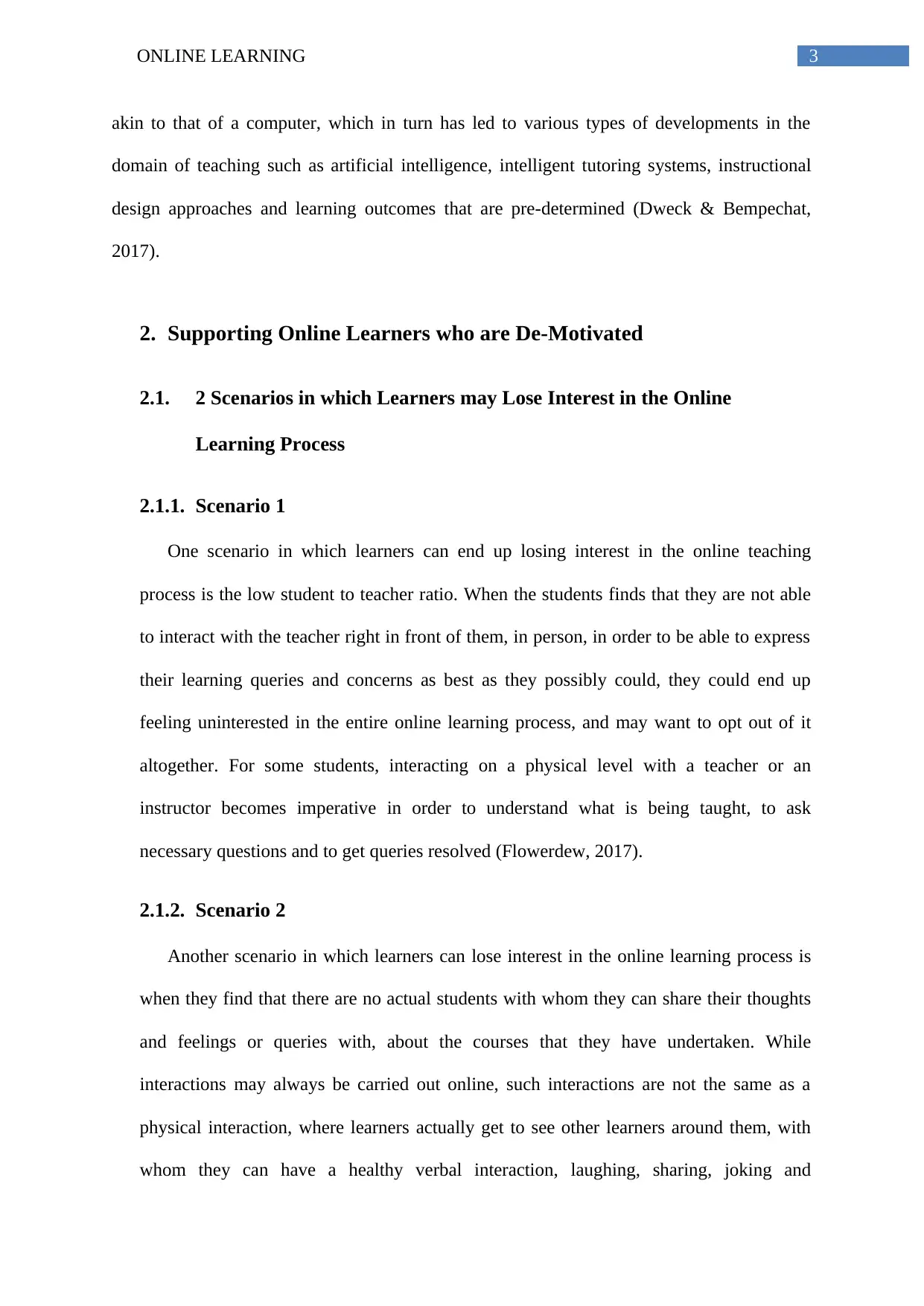
3ONLINE LEARNING
akin to that of a computer, which in turn has led to various types of developments in the
domain of teaching such as artificial intelligence, intelligent tutoring systems, instructional
design approaches and learning outcomes that are pre-determined (Dweck & Bempechat,
2017).
2. Supporting Online Learners who are De-Motivated
2.1. 2 Scenarios in which Learners may Lose Interest in the Online
Learning Process
2.1.1. Scenario 1
One scenario in which learners can end up losing interest in the online teaching
process is the low student to teacher ratio. When the students finds that they are not able
to interact with the teacher right in front of them, in person, in order to be able to express
their learning queries and concerns as best as they possibly could, they could end up
feeling uninterested in the entire online learning process, and may want to opt out of it
altogether. For some students, interacting on a physical level with a teacher or an
instructor becomes imperative in order to understand what is being taught, to ask
necessary questions and to get queries resolved (Flowerdew, 2017).
2.1.2. Scenario 2
Another scenario in which learners can lose interest in the online learning process is
when they find that there are no actual students with whom they can share their thoughts
and feelings or queries with, about the courses that they have undertaken. While
interactions may always be carried out online, such interactions are not the same as a
physical interaction, where learners actually get to see other learners around them, with
whom they can have a healthy verbal interaction, laughing, sharing, joking and
akin to that of a computer, which in turn has led to various types of developments in the
domain of teaching such as artificial intelligence, intelligent tutoring systems, instructional
design approaches and learning outcomes that are pre-determined (Dweck & Bempechat,
2017).
2. Supporting Online Learners who are De-Motivated
2.1. 2 Scenarios in which Learners may Lose Interest in the Online
Learning Process
2.1.1. Scenario 1
One scenario in which learners can end up losing interest in the online teaching
process is the low student to teacher ratio. When the students finds that they are not able
to interact with the teacher right in front of them, in person, in order to be able to express
their learning queries and concerns as best as they possibly could, they could end up
feeling uninterested in the entire online learning process, and may want to opt out of it
altogether. For some students, interacting on a physical level with a teacher or an
instructor becomes imperative in order to understand what is being taught, to ask
necessary questions and to get queries resolved (Flowerdew, 2017).
2.1.2. Scenario 2
Another scenario in which learners can lose interest in the online learning process is
when they find that there are no actual students with whom they can share their thoughts
and feelings or queries with, about the courses that they have undertaken. While
interactions may always be carried out online, such interactions are not the same as a
physical interaction, where learners actually get to see other learners around them, with
whom they can have a healthy verbal interaction, laughing, sharing, joking and
Secure Best Marks with AI Grader
Need help grading? Try our AI Grader for instant feedback on your assignments.
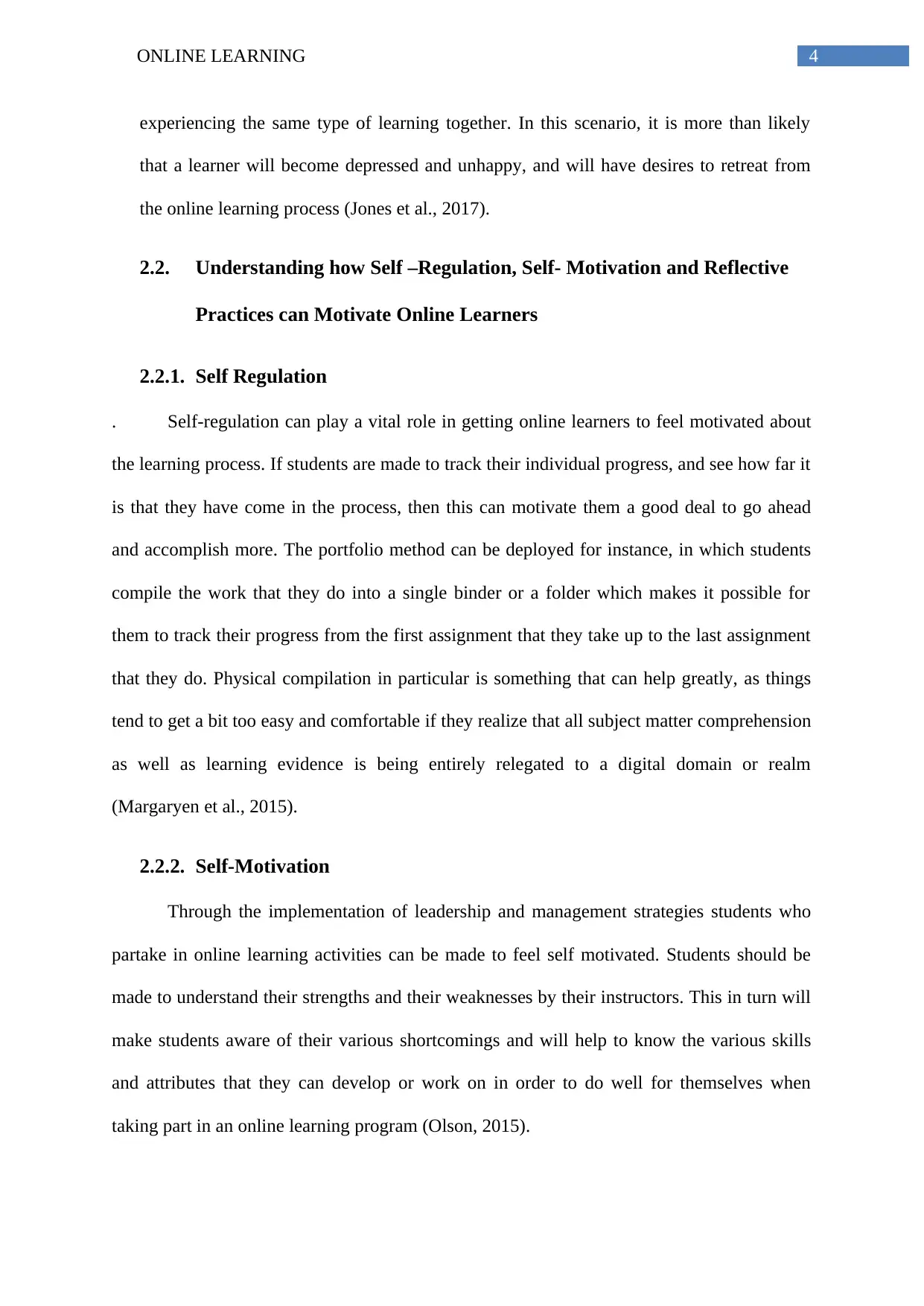
4ONLINE LEARNING
experiencing the same type of learning together. In this scenario, it is more than likely
that a learner will become depressed and unhappy, and will have desires to retreat from
the online learning process (Jones et al., 2017).
2.2. Understanding how Self –Regulation, Self- Motivation and Reflective
Practices can Motivate Online Learners
2.2.1. Self Regulation
. Self-regulation can play a vital role in getting online learners to feel motivated about
the learning process. If students are made to track their individual progress, and see how far it
is that they have come in the process, then this can motivate them a good deal to go ahead
and accomplish more. The portfolio method can be deployed for instance, in which students
compile the work that they do into a single binder or a folder which makes it possible for
them to track their progress from the first assignment that they take up to the last assignment
that they do. Physical compilation in particular is something that can help greatly, as things
tend to get a bit too easy and comfortable if they realize that all subject matter comprehension
as well as learning evidence is being entirely relegated to a digital domain or realm
(Margaryen et al., 2015).
2.2.2. Self-Motivation
Through the implementation of leadership and management strategies students who
partake in online learning activities can be made to feel self motivated. Students should be
made to understand their strengths and their weaknesses by their instructors. This in turn will
make students aware of their various shortcomings and will help to know the various skills
and attributes that they can develop or work on in order to do well for themselves when
taking part in an online learning program (Olson, 2015).
experiencing the same type of learning together. In this scenario, it is more than likely
that a learner will become depressed and unhappy, and will have desires to retreat from
the online learning process (Jones et al., 2017).
2.2. Understanding how Self –Regulation, Self- Motivation and Reflective
Practices can Motivate Online Learners
2.2.1. Self Regulation
. Self-regulation can play a vital role in getting online learners to feel motivated about
the learning process. If students are made to track their individual progress, and see how far it
is that they have come in the process, then this can motivate them a good deal to go ahead
and accomplish more. The portfolio method can be deployed for instance, in which students
compile the work that they do into a single binder or a folder which makes it possible for
them to track their progress from the first assignment that they take up to the last assignment
that they do. Physical compilation in particular is something that can help greatly, as things
tend to get a bit too easy and comfortable if they realize that all subject matter comprehension
as well as learning evidence is being entirely relegated to a digital domain or realm
(Margaryen et al., 2015).
2.2.2. Self-Motivation
Through the implementation of leadership and management strategies students who
partake in online learning activities can be made to feel self motivated. Students should be
made to understand their strengths and their weaknesses by their instructors. This in turn will
make students aware of their various shortcomings and will help to know the various skills
and attributes that they can develop or work on in order to do well for themselves when
taking part in an online learning program (Olson, 2015).
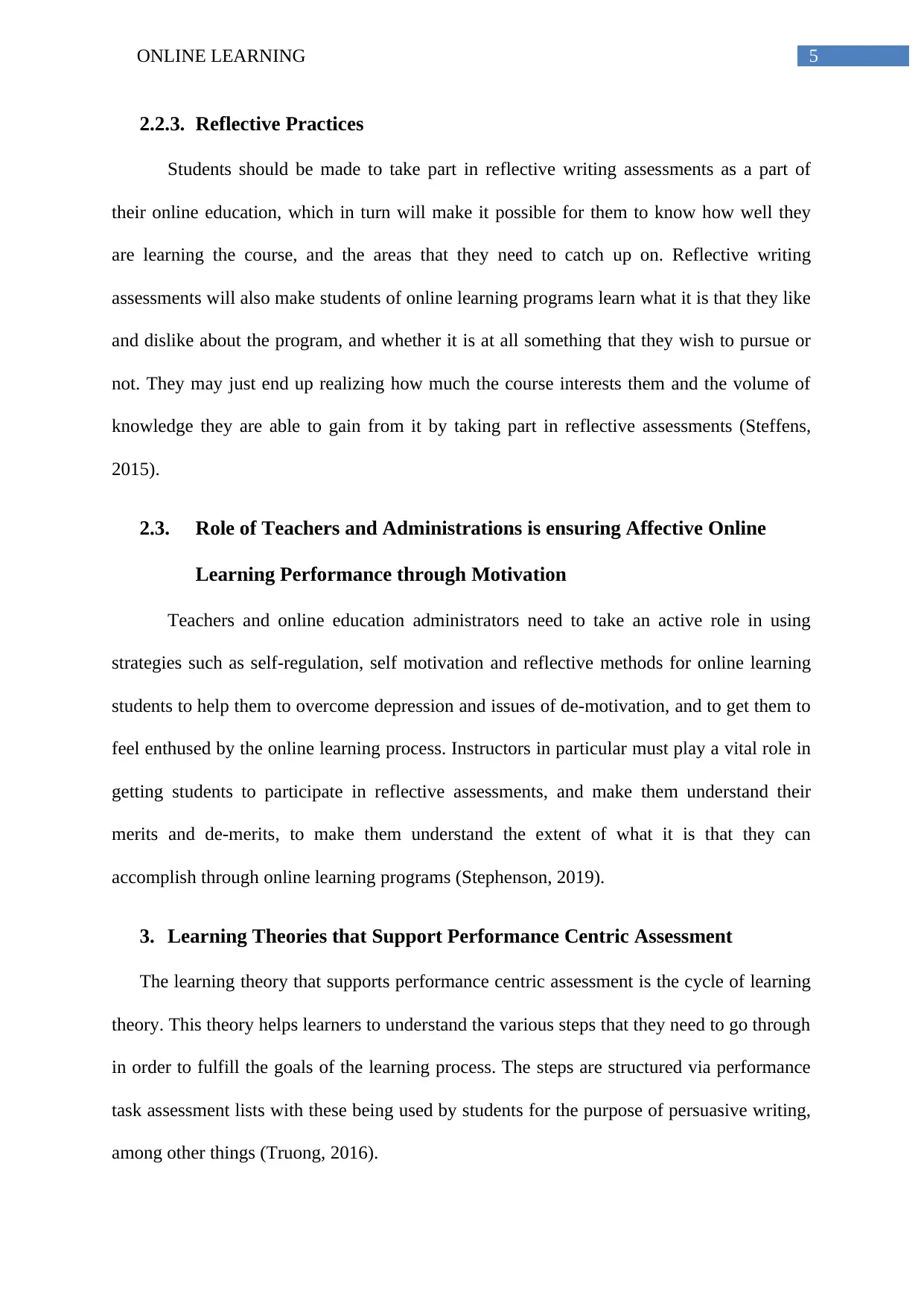
5ONLINE LEARNING
2.2.3. Reflective Practices
Students should be made to take part in reflective writing assessments as a part of
their online education, which in turn will make it possible for them to know how well they
are learning the course, and the areas that they need to catch up on. Reflective writing
assessments will also make students of online learning programs learn what it is that they like
and dislike about the program, and whether it is at all something that they wish to pursue or
not. They may just end up realizing how much the course interests them and the volume of
knowledge they are able to gain from it by taking part in reflective assessments (Steffens,
2015).
2.3. Role of Teachers and Administrations is ensuring Affective Online
Learning Performance through Motivation
Teachers and online education administrators need to take an active role in using
strategies such as self-regulation, self motivation and reflective methods for online learning
students to help them to overcome depression and issues of de-motivation, and to get them to
feel enthused by the online learning process. Instructors in particular must play a vital role in
getting students to participate in reflective assessments, and make them understand their
merits and de-merits, to make them understand the extent of what it is that they can
accomplish through online learning programs (Stephenson, 2019).
3. Learning Theories that Support Performance Centric Assessment
The learning theory that supports performance centric assessment is the cycle of learning
theory. This theory helps learners to understand the various steps that they need to go through
in order to fulfill the goals of the learning process. The steps are structured via performance
task assessment lists with these being used by students for the purpose of persuasive writing,
among other things (Truong, 2016).
2.2.3. Reflective Practices
Students should be made to take part in reflective writing assessments as a part of
their online education, which in turn will make it possible for them to know how well they
are learning the course, and the areas that they need to catch up on. Reflective writing
assessments will also make students of online learning programs learn what it is that they like
and dislike about the program, and whether it is at all something that they wish to pursue or
not. They may just end up realizing how much the course interests them and the volume of
knowledge they are able to gain from it by taking part in reflective assessments (Steffens,
2015).
2.3. Role of Teachers and Administrations is ensuring Affective Online
Learning Performance through Motivation
Teachers and online education administrators need to take an active role in using
strategies such as self-regulation, self motivation and reflective methods for online learning
students to help them to overcome depression and issues of de-motivation, and to get them to
feel enthused by the online learning process. Instructors in particular must play a vital role in
getting students to participate in reflective assessments, and make them understand their
merits and de-merits, to make them understand the extent of what it is that they can
accomplish through online learning programs (Stephenson, 2019).
3. Learning Theories that Support Performance Centric Assessment
The learning theory that supports performance centric assessment is the cycle of learning
theory. This theory helps learners to understand the various steps that they need to go through
in order to fulfill the goals of the learning process. The steps are structured via performance
task assessment lists with these being used by students for the purpose of persuasive writing,
among other things (Truong, 2016).
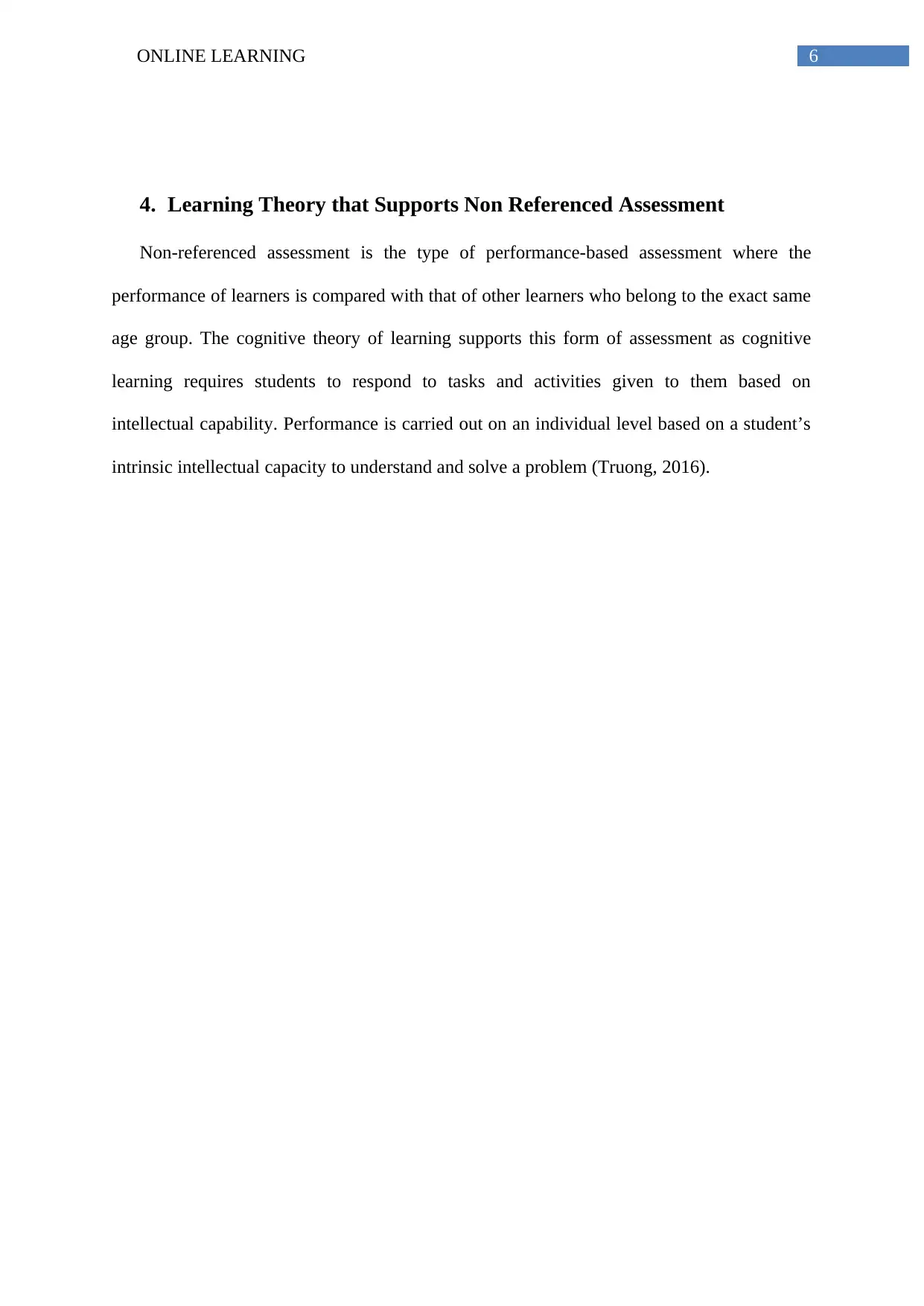
6ONLINE LEARNING
4. Learning Theory that Supports Non Referenced Assessment
Non-referenced assessment is the type of performance-based assessment where the
performance of learners is compared with that of other learners who belong to the exact same
age group. The cognitive theory of learning supports this form of assessment as cognitive
learning requires students to respond to tasks and activities given to them based on
intellectual capability. Performance is carried out on an individual level based on a student’s
intrinsic intellectual capacity to understand and solve a problem (Truong, 2016).
4. Learning Theory that Supports Non Referenced Assessment
Non-referenced assessment is the type of performance-based assessment where the
performance of learners is compared with that of other learners who belong to the exact same
age group. The cognitive theory of learning supports this form of assessment as cognitive
learning requires students to respond to tasks and activities given to them based on
intellectual capability. Performance is carried out on an individual level based on a student’s
intrinsic intellectual capacity to understand and solve a problem (Truong, 2016).
Paraphrase This Document
Need a fresh take? Get an instant paraphrase of this document with our AI Paraphraser
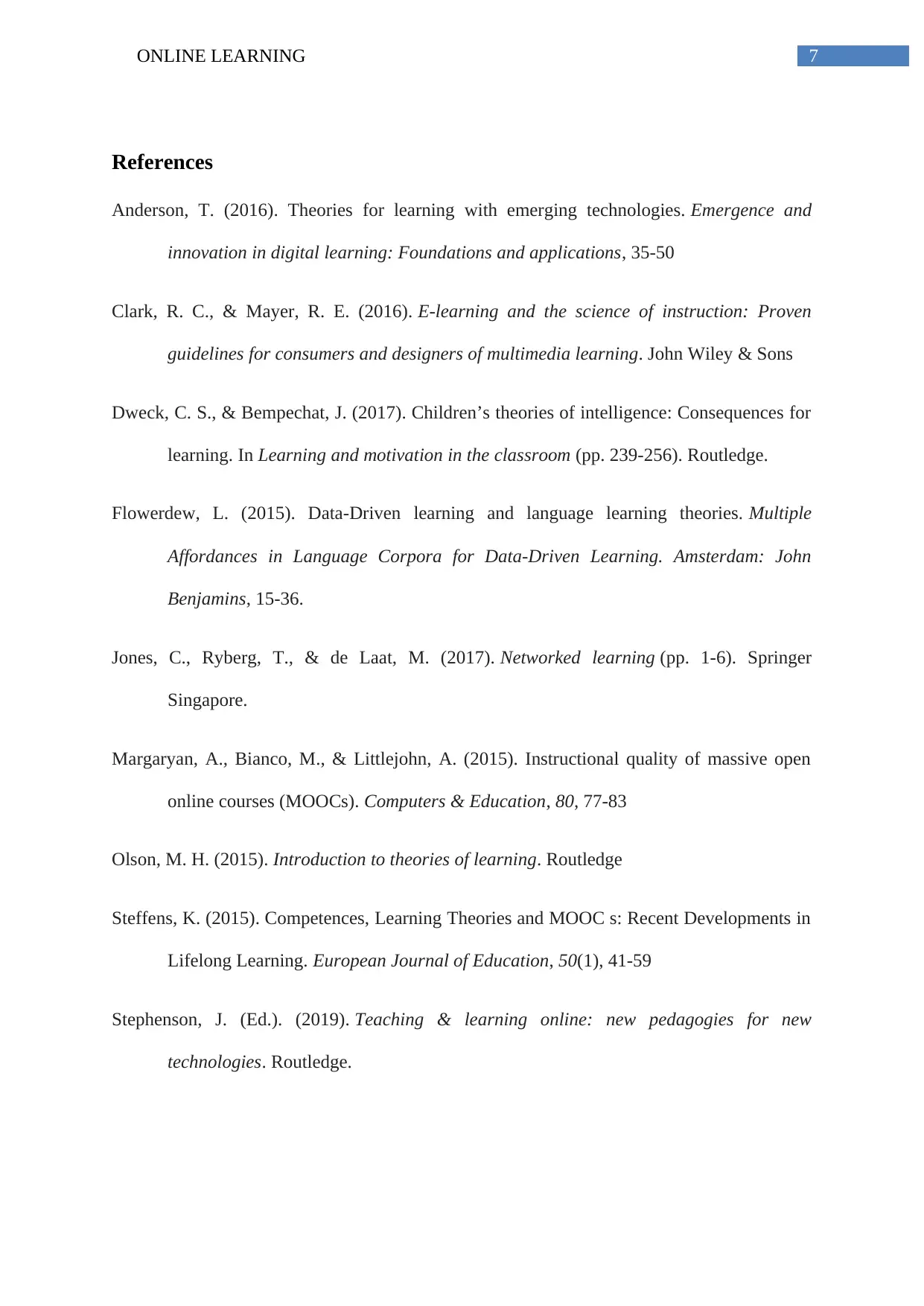
7ONLINE LEARNING
References
Anderson, T. (2016). Theories for learning with emerging technologies. Emergence and
innovation in digital learning: Foundations and applications, 35-50
Clark, R. C., & Mayer, R. E. (2016). E-learning and the science of instruction: Proven
guidelines for consumers and designers of multimedia learning. John Wiley & Sons
Dweck, C. S., & Bempechat, J. (2017). Children’s theories of intelligence: Consequences for
learning. In Learning and motivation in the classroom (pp. 239-256). Routledge.
Flowerdew, L. (2015). Data-Driven learning and language learning theories. Multiple
Affordances in Language Corpora for Data-Driven Learning. Amsterdam: John
Benjamins, 15-36.
Jones, C., Ryberg, T., & de Laat, M. (2017). Networked learning (pp. 1-6). Springer
Singapore.
Margaryan, A., Bianco, M., & Littlejohn, A. (2015). Instructional quality of massive open
online courses (MOOCs). Computers & Education, 80, 77-83
Olson, M. H. (2015). Introduction to theories of learning. Routledge
Steffens, K. (2015). Competences, Learning Theories and MOOC s: Recent Developments in
Lifelong Learning. European Journal of Education, 50(1), 41-59
Stephenson, J. (Ed.). (2019). Teaching & learning online: new pedagogies for new
technologies. Routledge.
References
Anderson, T. (2016). Theories for learning with emerging technologies. Emergence and
innovation in digital learning: Foundations and applications, 35-50
Clark, R. C., & Mayer, R. E. (2016). E-learning and the science of instruction: Proven
guidelines for consumers and designers of multimedia learning. John Wiley & Sons
Dweck, C. S., & Bempechat, J. (2017). Children’s theories of intelligence: Consequences for
learning. In Learning and motivation in the classroom (pp. 239-256). Routledge.
Flowerdew, L. (2015). Data-Driven learning and language learning theories. Multiple
Affordances in Language Corpora for Data-Driven Learning. Amsterdam: John
Benjamins, 15-36.
Jones, C., Ryberg, T., & de Laat, M. (2017). Networked learning (pp. 1-6). Springer
Singapore.
Margaryan, A., Bianco, M., & Littlejohn, A. (2015). Instructional quality of massive open
online courses (MOOCs). Computers & Education, 80, 77-83
Olson, M. H. (2015). Introduction to theories of learning. Routledge
Steffens, K. (2015). Competences, Learning Theories and MOOC s: Recent Developments in
Lifelong Learning. European Journal of Education, 50(1), 41-59
Stephenson, J. (Ed.). (2019). Teaching & learning online: new pedagogies for new
technologies. Routledge.

8ONLINE LEARNING
Truong, H. M. (2016). Integrating learning styles and adaptive e-learning system: Current
developments, problems and opportunities. Computers in human behavior, 55, 1185-
1193.
Truong, H. M. (2016). Integrating learning styles and adaptive e-learning system: Current
developments, problems and opportunities. Computers in human behavior, 55, 1185-
1193.
1 out of 9
Related Documents
Your All-in-One AI-Powered Toolkit for Academic Success.
+13062052269
info@desklib.com
Available 24*7 on WhatsApp / Email
![[object Object]](/_next/static/media/star-bottom.7253800d.svg)
Unlock your academic potential
© 2024 | Zucol Services PVT LTD | All rights reserved.




